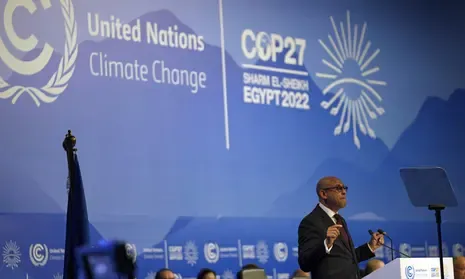The UN secretary general, Antonio Guterres, did not mince words in a margin with the press on the eve of COP27, the international climate conference that from today until November 18 will be held in Sharm el-Sheikh in Egypt:
The COP27 must be the place to rebuild trust and re-establish the ambition needed to avoid leading our planet over the climatic precipice. All the reports paint a clear and troubling picture. Emissions continue to grow at record levels. Instead of falling by 45% by 2030, greenhouse gas emissions will increase by 10%. Temperatures will rise by as much as 2.8 degrees by the end of the century.
According to reports from the IPCC (Intergovernmental Panel on Climate Change) to keep global warming below 1.5 ° C, the world is expected to reduce its emissions by 43%, compared to 2019, when global emissions of anthropogenic origin were 52.6 billion tons of CO2 equivalent (GtCO2eq). If we wanted to stay below the 2 ° C increase, the threshold beyond which climate changes would have catastrophic consequences on society and ecosystems, global emissions by 2030 should be reduced by 27%.
It should be remembered that, the Glasgow Climate Pact signed at COP26 in 2019, included a serious commitment to the reduction of methane emissions, the progressive decrease in the use of coal as well as the fight against deforestation, it seemed a low but still promising compromise. The States also committed themselves to updating the Nationally Determined Conditions (NCDs), that is the document in which each country draws up a plan to reduce its national polluting emissions. Of 193 countries, only 24 broadcast a new version of their NDCs after the Glasgow conference. Compared to October 2021, only 39 countries delivered updated versions of the documents on the eve of COP27. Not only that, the new versions are not at all sufficient to achieve the emission reduction targets established in 2015 by the Paris agreements.
According to the summary document prepared for discussion at COP27 by the UNFCCC (the United Nations Framework Convention on Climate Change), on the basis of the documents presented, even if all countries fulfilled all the commitments signed in the NDCs, the impact would be, at most, a reduction in emissions of 3.6% by 2030. The most pessimistic forecasts foresee almost unchanged emissions, 0.3% less than the levels of 2019 at the maximum. 'Better than nothing' would be said, yet despite some progress compared to previous versions of this report, the information contained herein implies an urgent need or a significant increase in the level of ambition of NDCs between now and 2030. either a significant overshoot of the NDCs' goals, or a combination of the two. If emissions are not reduced by 2030, they will have to be reduced even more substantially later on.
'If not now when' is the immediate objection if we consider that, by the end of the century, a rise in the planet's temperature of 2.5 ° C is expected, in a range that goes from 2.1 ° C to 2 , 9 ° C, well beyond the estimates of the Paris agreements. This is confirmed by a report by the UN Environmental Program (UNEP), entitled 'The window that is closing' which certifies how the policies currently underway will bring annual emissions to 58 GtCO2eq in 2030, while the fulfillment of the commitments presented so far it will lead to a reduction of 3 or 6 GtCO2eq. So there would still be 15 GtCO2eq to have a 66% chance of keeping global warming below 2 ° C and 23GtCO2eq to stay below 1.5 ° C. If things remain as they are now, the planet's temperature will rise by 2.8 ° C. If we do some or all of what today is promised to do, global warming at the end of the century will still have grown by 2.6 ° C or 2.4 ° C compared to the pre-industrial era. In practice, it will be almost impossible to keep temperatures within + 1.5 ° C and without a turnaround with current policies at the end of the century there will be a temperature increase of 2.8 ° C. But even if temperatures were to rise 1.7 to 1.8 ° C above 1850 levels, half of the world's population as well as biodiversity could be exposed to life-threatening levels of heat and humidity.
The Ukrainian crisis has caused an energy crisis that many fear will slow down the efforts of decarbonisation and the fight against emissions, and, as is well known, a real transition does not happen overnight. In the event of an emergency, he was even seen to step back as the case of Germany demonstrates.
References:
https://unfccc.int/documents/619180
https://unfccc.int/news/cop27-in-sharm-el-sheikh-to-focus-on-delivering-on-the-promises-of-paris







